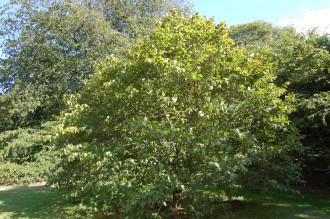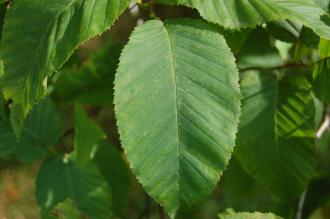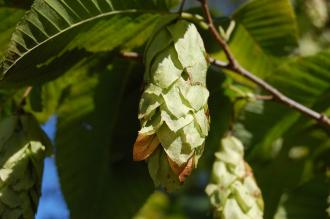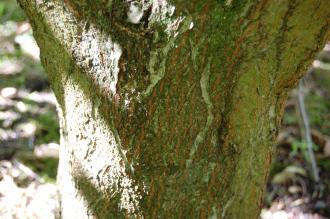
Carpinus cordata (17/08/2014, Kew Gardens, London)
Position: Sun to shade
Soil: Moist, well drained
Flowering period: Late spring
Eventual Height: 15m
Eventual Spread: 15m
Hardiness: 5a, 5b, 6a, 6b, 7a, 7b, 8a, 8b, 9a
Family: Betulaceae

Carpinus cordata Leaf (17/08/2014, Kew Gardens, London)
Carpinus cordata is a slow growing deciduous tree with a juvenile pyramidal form, this matures to a more rounded habit. Its dark green leaves are ovate with a heart shaped clef at their bases and serrulate margins, up to 11cm long and 5cm broad. Its monoecious flowers are in the form of yellow/ green catkins and are wind pollinated. Its initially green fruit appear after the female flowers, are encase in three lobed bracts which mature to brown and are up to 8cm long.
Carpinus cordata, commonly known as Heartleaf Hornbeam, is native to Japan, north east China, Korea and south east Russia. In its native habitat it grows in forests on moist mountain slopes.

Carpinus cordata Fruit (17/08/2014, Kew Gardens, London)
The etymological root of the binomial name Carpinus was the ancient Latin name for this species. Cordata is derived from the Latin meaning ‘heart shaped’.
The landscape architect may find Carpinus cordata useful as a compact tree suitable for shady locations.
Ecologically, Carpinus cordata is of little value to UK wildlife.

Carpinus cordata Bark (17/08/2014, Kew Gardens, London)
Carpinus cordata prefers moist, fertile, humus rich, well-drained soils. It tolerates most pH of soil.
Carpinus betulus requires little maintenance.

